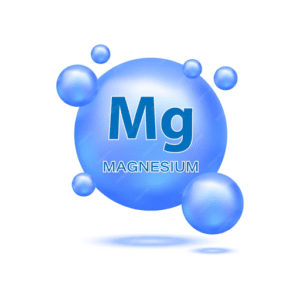I love magnesium. Most people don’t have enough, and it has many roles to play in the body.1 Most cases of magnesium deficiency are not diagnosed because most magnesium is found inside of cells. Low levels can increase the risk of cardiovascular disease.1 It
- It is necessary to produce energy in each and every cell and aid’s mitochondrial function. Mitochondria are the powerhouses in every cell and makes ATP which is energy.
- It’s involved in over 300 enzymatic reactions, contributing to muscle function, nerve transmission, blood glucose control, and protein synthesis.2
- Magnesium can also be relaxing. It can relieve muscle tension, headaches, blood vessel tightening and has a relaxing effect on heart rhythm. It has also been shown to be helpful in metabolic syndrome, diabetes and diabetic complications, premenstrual syndrome, high cholesterol, and asthma. 3
Despite its importance, many people are unaware of the various forms of magnesium and their unique benefits. Understanding these differences can help you choose the right supplement to meet your specific health needs.

Magnesium Citrate: Aids Digestion and Relieves Constipation
Magnesium citrate is one of the most common forms of magnesium available. It’s known for its high bioavailability, meaning the body can absorb it more efficiently. This form is often recommended for individuals suffering from constipation as it has a mild laxative effect. Additionally, magnesium citrate can help improve digestion and alleviate symptoms of indigestion and heartburn.4
Magnesium Glycinate: Supports Sleep and Relieves Anxiety
Magnesium glycinate is a chelated form of magnesium, where magnesium is bound to the amino acid glycine. This combination makes it highly absorbable and gentle on the stomach. Magnesium glycinate is particularly beneficial for promoting relaxation and improving sleep quality. Glycine has calming properties, making this form of magnesium ideal for individuals dealing with anxiety, stress, and insomnia.
Magnesium Malate: Boosts Energy and Reduces Muscle Pain
Magnesium malate combines magnesium with malic acid, a compound found in fruits that plays a crucial role in the Krebs cycle, the energy production process in cells. This form is excellent for individuals experiencing chronic fatigue or fibromyalgia, as it can help increase energy levels and reduce muscle pain. Magnesium malate is also known to support overall muscle function and alleviate discomfort associated with exercise.
Magnesium Threonate: Enhances Cognitive Function
Magnesium threonate is a newer form of magnesium that has garnered attention for its potential to improve cognitive function. This form can cross the blood-brain barrier, making it particularly effective for enhancing memory, focus, and overall brain health. Research suggests that magnesium threonate may help with age-related cognitive decline and improve symptoms of neurological disorders such as ADHD.5
Magnesium Oxide: General Supplementation
Magnesium oxide is commonly used in over-the-counter supplements and antacids. While it has a lower bioavailability compared to other forms, it is an effective option for general supplementation and addressing magnesium deficiencies. Magnesium oxide is often used to relieve heartburn and indigestion and support bone health and muscle function.
Choosing the Right Magnesium Supplement
When selecting a magnesium supplement, it’s essential to consider your specific health needs and goals. For digestive issues, magnesium citrate might be the best choice. For anxiety and sleep support, magnesium glycinate is highly recommended. Those looking to boost their energy levels and reduce muscle pain may benefit from magnesium malate, while individuals aiming to enhance cognitive function should consider magnesium threonate.
Consumer Labs tests products and stated products can be contaminated with toxic heavy metals such lead, cadmium and arsenic. Be sure to get magnesium from a reliable source as most minerals come from the earth and most companies don’t test for the presence of metals. Sign up for Supplement Savvy to receive complimentary protocols and access to high quality supplements at a discount direct from the manufacturer or authorized distributor. There is no cost and no obligation. Always consult with a healthcare professional before starting any new supplement regimen to ensure it’s appropriate for your health condition.
References
. DiNicolantonio JJ, O’Keefe JH, Wilson W. Subclinical magnesium deficiency: a principal driver of cardiovascular disease and a public health crisis. Open Heart. 2018;5(1):e000668. doi:10.1136/openhrt-2017-000668
- Office of Dietary Supplements – Magnesium. Accessed May 17, 2024. https://ods.od.nih.gov/factsheets/Magnesium-HealthProfessional/
- Schwalfenberg GK, Genuis SJ. The Importance of Magnesium in Clinical Healthcare. Scientifica. 2017;2017:4179326. doi:10.1155/2017/4179326
- Lindberg JS, Zobitz MM, Poindexter JR, Pak CY. Magnesium bioavailability from magnesium citrate and magnesium oxide. J Am Coll Nutr. 1990;9(1):48-55. doi:10.1080/07315724.1990.10720349
- Zhang C, Hu Q, Li S, et al. A Magtein®, Magnesium L-Threonate, -Based Formula Improves Brain Cognitive Functions in Healthy Chinese Adults. Nutrients. 2022;14(24):5235. doi:10.3390/nu14245235





She is a recognized and award-winning holistic, functional, integrative and anti-aging healthcare practitioner, speaker and author, and has been featured in ABC News, Forbes, WOR Radio and many media outlets to spread the word that you can live younger and healthier at any age.